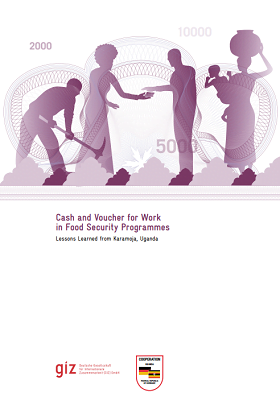Cash and Voucher for Work in Food Security Programmes Lessons Learned from Karamoja, Uganda
This report examines a Deutsche Gesellschaft für Internationale Zusammenarbeit (GIZ) GmbH supported labourintensive cash for work and voucher for work project which was implemented in the framework of GIZ’s Food and Nutrition Security and Conflict Management Project (FNS) in Karamoja. The FNS project was commissioned by the German Federal Ministry for Economic Cooperation and Development (BMZ). The study relates GIZ’s experience in cash and vouchers for work to key issues emerging from the wider literature on cash and voucher-based responses.
Cash and voucher interventions in Karamoja are a relatively new programmatic approach. The interest in this type of programming in Karamoja stems from a general trend of shifting from food aid to food assistance in a region that has historically been highly dependent on food aid. GIZ has been implementing cash and voucher for work projects in Karamoja since 2010, but the work has been relatively small-scale. World Food Programme (WFP) and partners also embarked on cash transfers through labour-intensive public work programmes in 2011, and although the timeframes for implementation and the overall number of beneficiaries in this case is significantly higher than in this GIZ activity, the work is still described as pilot in nature. This report intends to stimulate early discussion and to promote learning between cash transfer stakeholders within Karamoja and Uganda more generally, and to make a contribution to the general international discourse on voucher and cash transfer programmes.
After a brief introduction, Section Two of the report provides a summary of the current international discourse on the use of cash and vouchers as an assistance instrument. In Section Three the context in which GIZ is working in Karamoja is reviewed, and GIZ’s cash and voucher for work experience in this region is analysed critically. Section Four summarises lessons learned from the study, and Section Five concludes the report with a series of recommendations in particular regarding considerations for scaling up cash or voucher for work programmes in Karamoja.
A number of project documents and background materials were reviewed for the purpose of this study, including the needs assessment, market analyses, lessons learned and community surveys on the impact of the cash and voucher for work interventions. A wider literature review was also carried out regarding good practice in cash and voucher programming. A consultant undertook a short field trip to Karamoja in August 2011. Interviews were conducted with project staff, local government officials, UN agencies, as well as with a small number of project beneficiaries and traders in Iriiri Trading Centre. On the field trip the consultant was accompanied by the GIZ FNS infrastructure project staff. Interview results with project beneficiaries and traders were cross-checked with those of project staff and project documents to compare possibly differing perceptions of project intentions and results.



